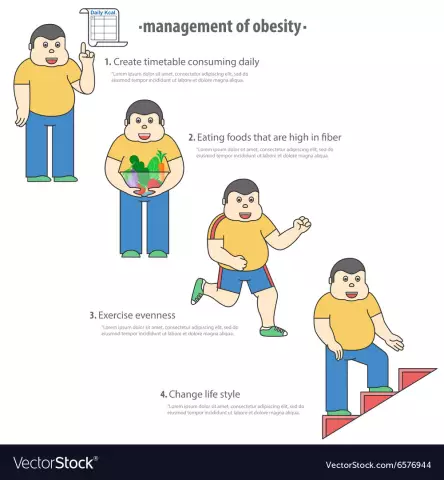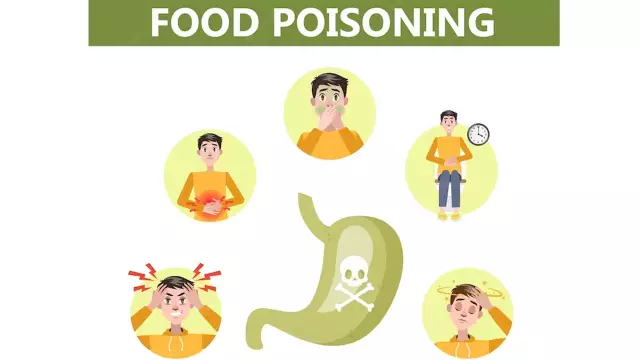- Author Rachel Wainwright wainwright@abchealthonline.com.
- Public 2023-12-15 07:39.
- Last modified 2025-11-02 20:14.
Diet for obesity

Obesity is one of the main medical problems faced by humanity today. Excess body weight is associated with such serious diseases as diabetes mellitus, deforming osteoarthritis, hypertension, atherosclerosis. Moreover, being overweight is a cosmetic defect.
Obesity treatment
For the treatment of obesity, three types of interventions are used: non-pharmacological agents, drugs and surgery. Non-drug therapies include educating patients individually or in special groups, increasing physical activity and nutrition. At the same time, it is the correction of eating habits that is crucial. Without a diet, one cannot expect a significant effect. Even if a person loses weight, the result will be temporary.
Traditional diet for obesity

Excess weight is primarily an excess of adipose tissue. To normalize body weight and improve your figure, you must follow a fat-burning diet. Of course, any calorie restricting diet is a fat-burning diet. After all, by reducing the intake of energy from food, you will force the body to spend its own reserves (adipose tissue). A diet for obesity from the point of view of a doctor is a balanced diet. The main principle of such a diet is to reduce the calorie content of the daily menu by 20-30%, which on average amounts to a deficit of 800-1200 kilocalories per day. In addition, the proportion of fat in the diet decreases, especially of animal origin. It is assumed that the minimum amount of fatty foods in the diet will help you lose weight quickly and for a long time. At the same time, a diet for obesity contains a relatively large amount of complex carbohydrates,vegetable fiber. These substances reduce appetite and help you achieve fullness without overeating. The balance of the main food ingredients assumes the presence of up to 60% carbohydrates, 25% proteins and 15% fats in the daily diet. Eating is recommended 4-5 times a day in small portions. Breakfast should be about 25% of the daily calorie content, lunch - 35%, dinner - 20%. Two more meals - lunch and afternoon tea, each should be about 10% of the daily calorie content of the menu. You need to have dinner 4 hours before bedtime, preferably before 20 hours. A traditional obese diet helps you lose 1 kg per week. The total loss of body weight during the course of weight loss is 7-10 kg, and the diet removes fat, not muscle tissue. Doctors' advice on calorie intake and split meals is often difficult for an obese patient to follow. After all, it takes patience and willpower to follow a balanced medical diet that burns fat. The results with such a diet will not be too soon, but your health will not suffer.
Fat Burning Diet
In the modern sense, a fat-burning diet should be effective and efficient in the shortest possible time. Low-calorie diets and fasting to reduce body weight can only be recommended for severe obesity in stationary conditions. A low-carb diet is recognized as a fat-burning diet. The method of limiting carbohydrates in food is based on scientific ideas about metabolism. Scientists know that carbohydrates in food mainly increase blood sugar and are used as energy. If you exclude them, the body will have to switch to another source of energy in order to maintain its vital functions. Such a diet removes fat and helps you lose weight in no time. A feature of the fat burning diet is its imbalance. Such nutrition is difficult to tolerate with diseases of the kidneys, liver, heart. Do not limit carbohydrates in food for a long time. The advantage of a fat-burning diet is its appetite-suppressing effect.
Found a mistake in the text? Select it and press Ctrl + Enter.






